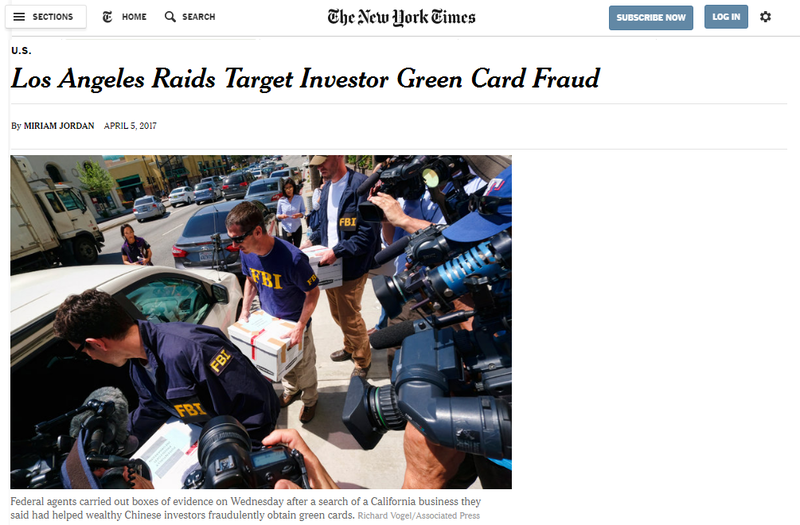Los Angeles Raids Target Investor Green Card Fraud
Federal agents on Wednesday executed search warrants at several sites in greater Los Angeles that the authorities say were connected to a $50 million visa fraud operation that enabled Chinese citizens, including fugitives from the law, to secure green cards for permanent residency in the United States.
The multiyear investigation, which used Mandarin-speaking agents, is the latest to highlight abuses in the EB-5 program, which offers foreign investors a fast path to a green card. The program is also the target of a crackdown by the Securities and Exchange Commission.
The search warrants include allegations of visa fraud, money laundering and “inducing foreigners to reside in the U.S. in violation of the law.” More than 100 people have been linked to the scheme, according to the Department of Homeland Security, which worked with the F.B.I. on the investigation.
Under the EB-5 program, foreigners and their immediate families are eligible for a green card if they invest $500,000 in a development project in an area of high unemployment that creates at least 10 jobs. Participation can result in a green card in less than a year in some instances. The cards can normally take a decade to obtain through sponsorship from an American employer or relative.
Wealthy Chinese eager for a foothold in the United States account for the majority of EB-5 participants, and are often driven by concerns about long-term economic and political stability at home. Return on investment is secondary for many Chinese, who tend to focus on the opportunity to enroll their children in state colleges and eventually gain employment in the United States, experts say.
According to a 113-page affidavit filed by the F.B.I. in support of the search warrants, a lawyer identified as “Victoria” and her father, “Tat,” both Chinese citizens, conceived the scheme in 2008, using a business called the California Investment Immigration Fund. They offered wealthy Chinese the opportunity to obtain a green card under the EB-5 visa program by investing in cultural center, hotels and restaurants.
The pair are alleged to have enticed investors by offering them a partial refund of their $500,000-investment. Other times they simply took money from investors, according to the document. None of the projects, which were approved by the United States government, ever got off the ground.
Agents searching a businesses.
For instance, during visits in 2013 and three years later to a vacant building designated for development in the City of Industry outside Los Angeles, investigators found the structure surrounded by a chain-link fence and no active construction. Both times, they encountered a large sign in Chinese and English that read: “CIIF Investment Group” and “Retail Shops for Lease.”
A “San Gabriel Valley Chinese Cultural Center,” which the suspects gained approval to develop with EB-5 investor funds, also was never built, according to the affidavit.
Among the investors for whom the business submitted EB-5 petitions were fugitives from China’s 100 most-wanted list, which published by the Chinese Communist Judicial Prosecution Committee, the affidavit said. At least three fugitives were issued green cards under the EB-5 program. Among them is a former government official from Wuhan accused of “embezzlement, accepting bribes and abuse of power, for which the maximum punishment in China is death,“ according to the affidavit.
On Wednesday, agents seized computers, financial documents and other records from an office, two homes and a 2015 Porsche sports-utility vehicle tied to the suspects and to a third person described in the affidavit as a female companion to Mr. Tat.
No arrests were announced.
Participants in the EB-5 program have channeled billions of dollars into construction, the film industry and other sectors in recent years.
The program’s popularity has soared in the last decade. More than 14,000 foreigners applied to make investments in the United States through the program in the fiscal year ended Sept. 30, 2016, compared with 486 in 2006, according to United States Citizenship and Immigration Services, the agency that runs the program.
The program was begun in 1990 to spur job growth in economically depressed regions. But critics say that it benefits richer areas, often in big cities, and that it amounts to putting United States citizenship up for sale. They also point to a litany of fraud cases, which often involve sponsors of EB-5 investments who misappropriated funds from investors and used them for personal enrichment.
Republicans and Democrats lawmakers alike agree that the program is ripe for an overhaul, particularly to bolster oversight and to raise the minimum investment required to participate. But legislators from rural and urban areas diverge on how EB-5 funds should be distributed.
Any change is unlikely to materialize before the program expires on April 28. Instead, it is likely to receive a three- or six-month extension.
https://www.nytimes.com/2017/04/05/us/eb5-visa-investigation.html?_r=0
Mentions
- California Investment Immigration Fund (CIIF)
- U.S. Citizenship and Immigration Services
- UNITED STATES SECURITIES AND EXCHANGE COMMISSION
States
- California
Securities Disclaimer
This website is for informational purposes only and does not constitute an offer or solicitation to sell shares or securities. Any such offer or solicitation will be made only by means of an investment's confidential Offering Memorandum and in accordance with the terms of all applicable securities and other laws. This website does not constitute or form part of, and should not be construed as, any offer for sale or subscription of, or any invitation to offer to buy or subscribe for, any securities, nor should it or any part of it form the basis of, or be relied on in any connection with, any contract or commitment whatsoever. EB5Projects.com LLC and its affiliates expressly disclaim any and all responsibility for any direct or consequential loss or damage of any kind whatsoever arising directly or indirectly from: (i) reliance on any information contained in the website, (ii) any error, omission or inaccuracy in any such information or (iii) any action resulting therefrom.





